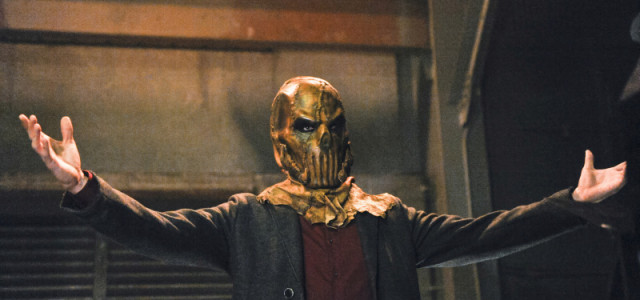
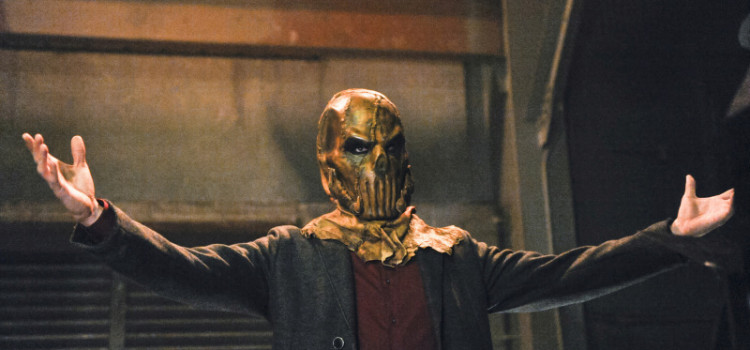
Arrow #2.21: “City of Blood” Recap & Review
Recaps & Reviews May 7, 2014 Matt Tucker

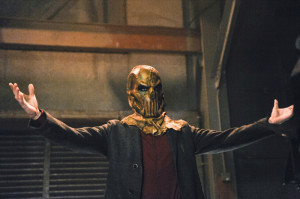 Summary: A lull of an episode that presents a necessary but less-than-engaging story.
Summary: A lull of an episode that presents a necessary but less-than-engaging story.
If you have not seen this episode yet and do not wish to be spoiled, do not continue reading!
Recap
Following Moira’s death, Sebastian Blood is made mayor of Starling City, resparking Laurel’s suspicions about him. At the funeral and reception for Moira, Oliver is nowhere to be found, worrying Diggle and Felicity. The resurrected Isabel puts in an appearance, alarming Team Arrow. They turn to Amanda Waller and ARGUS to help locate Oliver and discover that he is hiding out at a secret secondary base. Oliver had attempted to go to the funeral but the weight of everything kept him from going. He decides to offer himself up to Slade to stop anyone else from being hurt or killed. Isabel tells Thea that Queen Consolidated is looking to sell the foundry and that Verdant must vacate the premises. Thea decides that nothing is tying her to Starling City any longer and that she needs to leave, something Oliver encourages her to do. Diggle and Felicity stop Oliver before he turns himself over to Slade and Isabel, and Laurel reveals that she knows their secret. She attempts to stop Oliver from sacrificing himself by telling him that Sebastian was behind Moira’s death, confirmed by evidence gathered by her and Quentin. Now knowing the truth and expecting Blood to lead the Mirakuru army to attack the city, Team Arrow decides to kill the army in their underground lair, discovered when Felicity and Diggle kidnap one of Sebastian’s bodyguards. Attempting to do so, Oliver is nearly killed before Laurel arrives to save his life, endangering them both. On the island, Peter offers to sacrifice himself to pilot a torpedo to knock the Japanese submarine free to allow Oliver, Anatoly, and Sara to escape. Sara, though, ends up missing.
For a full recap of this episode, visit our handy episode guide.
Review
Necessity and circumstance have required us to not churn out reviews day-of or day-after like you are used to seeing out there. The quick reaction/response you see as common practice certainly has its place, and the practical thought is to get your best traffic by striking immediately. Yet, one of the advantages that circumstance has allowed is the opportunity to properly reflect on an episode and get an honest feel for how well a story sits or not. The live watch of an episode on Wednesday nights is often followed by a second (or third) watch to refresh thoughts and get the full impact, sort of like tasting a wine and then having a glass afterward. Whether you find that valuable or not — if you believe any television show is worth such consideration or find the idea rather silly — I believe Derek and I both are able to glean and appreciate more from an episode as a result.
Often, this has been advantageous, but sitting with ‘City of Blood,’ however, offered very little difference between the initial and subsequent viewings. The potential doldrum of the slow moving of chess pieces in this second half of ths season finally catches up with the show in this outing. It can be said that there is not a thing that is out of place, save for, perhaps, the Oliver-Blood confrontation at the restaurant, but this felt more like a collection of things that had to happen but would be in the way of either of the final two episodes.
 Seeing and feeling the impact of Moira’s death was certainly something we needed to share in, particularly with Oliver’s despondency. Curious then, the choice to have Oliver missing from the episode for most of the first two acts. In one regard, it works quite effectively, leaving Team Arrow rudderless with how to proceed. It is, perhaps, too effective, as the first half of the episode seems a bit aimless and dragging. Again, the order of events fits logically, as Diggle calls in a favor with Amanda Waller at ARGUS to track down their friend. They find Oliver at the secondary lair, and he makes the declaration that he’s going to give himself up to Slade to put an end to everything. It all works fine for the narrative, but it all just kind of lays there.
Seeing and feeling the impact of Moira’s death was certainly something we needed to share in, particularly with Oliver’s despondency. Curious then, the choice to have Oliver missing from the episode for most of the first two acts. In one regard, it works quite effectively, leaving Team Arrow rudderless with how to proceed. It is, perhaps, too effective, as the first half of the episode seems a bit aimless and dragging. Again, the order of events fits logically, as Diggle calls in a favor with Amanda Waller at ARGUS to track down their friend. They find Oliver at the secondary lair, and he makes the declaration that he’s going to give himself up to Slade to put an end to everything. It all works fine for the narrative, but it all just kind of lays there.
One of the big chess moves is the reveal Oliver’s secondary base of operations. His rationale for it makes complete sense; with the foundry sub-basement honestly a rather vulnerable location, having an alternative site to work from is not only a tactical imperative but a smart narrative choice. Making the point in having the resurrected Isabel Rochev serve an eviction notice to Thea for Verdant and Slade already having shown his ease at getting in and out of the Arrowcave, in addition to knowing of its existence and location, it seems quite clear that they are setting up this original base of operations for its last days on the series. What’s odd is Oliver never mentioning it to his partners. Again, his rationale makes sense, needing a place of his own to hide away on occasion to be with his own thoughts. All of us can certainly relate to that. It sets up an interesting dynamic with Team Arrow, though, in that he’s still keeping secrets from them. That harks back to his holding back on revealing to them that he had the opportunity to cure Slade of the Mirakuru back on the island but chose to kill him instead. What other dark secrets is Oliver keeping from everyone?
One such secret has to involve Amanda Waller and their previous connection, something alluded to back in “Suicide Squad.” It’s a bit odd that Diggle hasn’t really questioned either Waller or Oliver as to their connection, though it’s not hard to imagine that Diggle just takes it at face value that Waller keeps tabs on so many people in the course of her duties. The Waller-Oliver past is not likely something to be delved into this season, setting up a tasty thread for next year, but it’s a fair bet that Diggle’s time with the Suicide Squad will come into play at some point in the last two episodes of the season. Surprisingly — unless she’s playing her cards very close to the vest — Waller was shocked to learn of Slade’s Mirakuru army. You can bet that bringing her into that loop sets ARGUS up for some sort of role in the oncoming showdown.
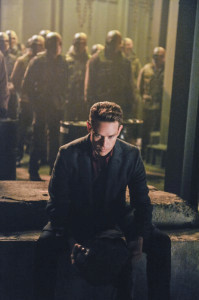 Now that Sebastian Blood is installed as mayor — his inauguration intercut with Moira’s funeral was a fitting and compelling editing choice — his truths are revealed. Not to the general public of Starling City, of course. At least, not yet. Laurel, though, gets to verify her concerns and finally bring her father on-board. In all fairness, it really plays very random of Laurel to suspect Sebastian further, assigning that to gut feeling or not, even with the results of her tenacity. Yet, there’s something quite satisfying to Laurel putting together yet more puzzle pieces and proactively getting the proof she needs. Sure, the smoking gun that finally sways Quentin to her side is a bit convenient, but greater conspiracies and abuses of power have been brought down by simple, overlooked things.
Now that Sebastian Blood is installed as mayor — his inauguration intercut with Moira’s funeral was a fitting and compelling editing choice — his truths are revealed. Not to the general public of Starling City, of course. At least, not yet. Laurel, though, gets to verify her concerns and finally bring her father on-board. In all fairness, it really plays very random of Laurel to suspect Sebastian further, assigning that to gut feeling or not, even with the results of her tenacity. Yet, there’s something quite satisfying to Laurel putting together yet more puzzle pieces and proactively getting the proof she needs. Sure, the smoking gun that finally sways Quentin to her side is a bit convenient, but greater conspiracies and abuses of power have been brought down by simple, overlooked things.
Oliver learning the truth of Blood’s involvement with Slade and as the ringleader of the Mirakuru army was another necessary movement of game pieces, yet his approach to address it was an odd one. Really, what was gained by his conversation with Sebastian? Revealing his awareness of the new mayor’s true intentions and his identity as the Arrow seemed purely like expositional positioning. Nothing new was learned and no discernible tactical advantage was gained. Was Oliver hoping that telling his “friend” that he was the vigilante would somehow shake Sebastian off of his long held and deeply invested plans? Now the two are explicitly aware of one another heading toward the conclusion of the season, but it seems that this could’ve been accomplish in far more elegant and relevant fashion.
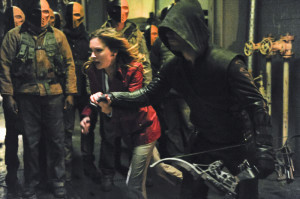 Also not elegant was Laurel’s reveal to Oliver that she knows his secret, yet here’s an occasion where it works for the narrative and furthers both character and plot along. I let out a very audible laugh with the matter-of-fact reveal that Laurel was just there in the Arrowcave, but it was one of recognition, joy, and acceptance. While I think there is still a long way to go with the character, it’s been impressive to see how much more they’ve added to her in this back half of the season. It might not sound complimentary to say that she’s not only proven competent but proactive and much more independent, but it truly feels as though they are trying their hardest to course correct for a character that was kind of slipping through the cracks and it’s working. Many likely still won’t feel that way, even though we’re finally starting to see the building blocks of a Laurel that everyone was clamoring to start down the Black Canary path from pilot episode. Yes, in a big sense, she’s in the way by showing up to Team Arrow’s attempted takedown of the Mirakuru army. It’s that spunk and verve that power her to be there when someone she cares for so much is putting his life on the line. It was what was supposed to be established by Laurel working for CNRI and standing up for the downtrodden but kind of got lost along the way. Now, when it’s most needed, we’re seeing the strains of these themes finally play out. It’s a positive development for the series.
Also not elegant was Laurel’s reveal to Oliver that she knows his secret, yet here’s an occasion where it works for the narrative and furthers both character and plot along. I let out a very audible laugh with the matter-of-fact reveal that Laurel was just there in the Arrowcave, but it was one of recognition, joy, and acceptance. While I think there is still a long way to go with the character, it’s been impressive to see how much more they’ve added to her in this back half of the season. It might not sound complimentary to say that she’s not only proven competent but proactive and much more independent, but it truly feels as though they are trying their hardest to course correct for a character that was kind of slipping through the cracks and it’s working. Many likely still won’t feel that way, even though we’re finally starting to see the building blocks of a Laurel that everyone was clamoring to start down the Black Canary path from pilot episode. Yes, in a big sense, she’s in the way by showing up to Team Arrow’s attempted takedown of the Mirakuru army. It’s that spunk and verve that power her to be there when someone she cares for so much is putting his life on the line. It was what was supposed to be established by Laurel working for CNRI and standing up for the downtrodden but kind of got lost along the way. Now, when it’s most needed, we’re seeing the strains of these themes finally play out. It’s a positive development for the series.
It continues to captivate to see Oliver stripped down to his essentials. His encouraging Thea to leave, ostensibly for her protection, makes all the sense in the world. He is raw, vulnerable, cut bear to the bone with little left to hold on to or use to put up a fight against Slade. His choice to offer himself up is an intriguing one, as much self-centered as it is self-sacrificing. Tying that thought directly into Peter’s sacrifice to free the Japanese submarine in the past does much to drive that concept home. Yet, one can’t help but feel this is all subterfuge, meant to divert the audience as much as Oliver. His assumption that Slade’s mention of one last person to die meant himself would seem like the obvious solution and resolution, and one the audience could buy into, particularly with the island storyline seen this hour out. Oliver seems to have missed a crucial point of Slade’s war against him, though: He’s more concerned with Oliver suffering than dying. Sure, Slade is aware that the possibility of his prey’s death is undeniable and possibly unavoidable, and driving an arrow into Oliver’s eye surely carries with it a strong fatal outcome. Slade, though, seems far more concerned with putting Oliver in the same place he’s been, a life of turmoil with everything he loved and held dear taken away from him. To that end, I’d posit that Slade was actually referring to Sara as the “one more person” not Oliver.
Thoughts that take your brain as you’re left with an episode full of necessary but nigh perfunctory events. It’s a cohesive whole but never really feels much more than setting up people and situations for what’s about to come. Perhaps it’s good to have a mild breather before all hell breaks loose.
Odds & Ends
- How did Oliver know to call Isabel to turn himself over to Slade? We can surmise that Felicity and Diggle told him off-screen that she was alive, but with the given info on-screen, Oliver should’ve still believed she was dead.
- As cool as the inauguration was, some steps in the process seemed to have been lost along the way. Usually, the election still has to be carried through and the votes tabulated, regardless if one of the candidates dies during the campaign. That takes time. Though, I guess this could be considered a special election, considering the city has been without a mayor for the better part of a year, and they wanted to get someone in place quickly. Where’s the deputy mayor during all of this?
- The scene between Oliver and Laurel in the Arrowcave discussing his being the Arrow was some of the best work between Amell and Cassidy together on the series.
- Speaking of inelegant, the last few minutes of the episode, setting up the various cliffhangers, seemed either oddly plotted or poorly edited. For as leisurely as things seemed most of the episode, the last two minutes were crammed and ended on a poor shot of the Mirakuru army marching on the city.
- What the hell happened with Sara in the past? Did she completely leave the sub of her own accord, only to be captured? Or was she stolen from the boat? In either case, it came off like a bit of a soapy development.
- Hat tip to the makeup crew on a particularly gruesome sight of Peter’s radiation ravaged body.
A SECOND OPINION
by Derek B. Gayle
The march towards the finale of Arrow’s second season was always going to be bloody—no pun intended—but “City of Blood” decidedly shifts focus away from the oncoming storm. It turns out to be for the best, though, as we get extensive use of supporting characters and a necessary, introspective expansion of Oliver as a character.
Oliver’s absence throughout the episode’s first half highlights a major flaw he’s had since the get-go: his inability to face his worst issues head-on. His decision when he finally does appear is the logical endpoint for this, where he decides to run away from all his problems by way of death. Oliver furiously defends his surrender as heroic sacrifice, but every other character smartly sees through this as short-sighted and, frankly, cowardly. Oliver’s not wrong that Slade’s main endgame is to kill him, but that’s not his full endgame, and Oliver clearly has blinders on to not see that. It’s silly for Oliver to believe Slade’s “one more person has to die” threat wouldn’t mean another of Oliver’s friends/family, and he quickly forgets the actual army Slade has been building. But it also wouldn’t be fair to call Oliver stupid for seeing things this way; he’s going through profound grief like any other person, and is simplifying matters in the same way that anyone would struggle to compartmentalize that grief. Oliver’s secret second facility—conveniently introduced at the same time Verdant has been taken over by Isabel—shows how much of a loner Oliver still is even now, and “City of Blood” spends ample time convincing him that he’s strongest as part of a team, despite all the turmoil this season.
That said, the episode also emphasizes that the overcrowding of Team Arrow was not for its benefit. Diggle and Felicity get the most to do since the season began, and it’s a joy seeing the core trio working together again without the drama from Sara or Roy interfering, enjoyable as that drama may have been at the time. But the spark between David Ramsey and Emily Bett Rickards, hidden as it often is in this show, is capable of carrying substantial weight this week. Frankly, it’s just fun to see Felicity and Diggle so intent on keeping Oliver on the right path, and the ratio of muscle/intelligence/heart between just the two makes a strong mystery-solving, crime-fighting pairing even without Oliver present. The “torture” scene is great fun, especially, and generally all of their scenes this week mix the right bit of much-needed heart and humor in an otherwise somber episode.
Laurel ends up being a bit of an interloper in the group, but she ends up functioning as more of a perspective, an outsider letting us see how well Oliver, Felicity and Diggle work together again from a fresh perspective. How Laurel factors in is sure to be controversial, though, as she essentially inducts herself into Team Arrow. Katie Cassidy is weighed down with some clunky dialogue during her big scenes, but this development is probably the best thing that’s happened with the character. Laurel’s positivity and proactivity actually ends up being the most optimistic part of the episode, surprisingly; she discovers the truth about Sebastian (though that timestamp was super sloppy, on Blood’s behalf), she reaches out to Diggle and Felicity, she convinces Oliver to give up his short-sighted solution (which she thankfully spells out is suicide), and her interference at the end doesn’t derail the mission by pinning her as a damsel in distress. The pessimistic side of this is that if Slade hadn’t incorrectly predicted Laurel’s reaction to the secret, Oliver would have completely lost here and now. But the implication is that Laurel’s long journey through season 2, which brought her down and dragged her through the mud, grounded her perceptions and let her better understand Oliver as the Arrow. It also lends more weight to her conversation with Oliver that tips the scales; she knows him from their youth, but she’s also understood what it means to hit rock bottom and climb your way up towards redemption. That entire journey hasn’t been terribly well-represented throughout the season, which is unfortunate, but the culmination of it has at least led to the best and most relevant use of the character.
Thea’s scenes, while good, seem to be mostly set-up for where her character is going later on. Everything continues to be ripped away, to the point that she plans to start completely anew, and it’s left her very cold, cynical, and hopeless. It’d be easy to over or underplay this, but Willa Holland takes great strides to keep this feeling like a natural transition for Thea. It’s actually quite devastating to see how much the girl who, as Oliver describes, is “the best of us” has fallen by absolutely no fault of her own, to the point that even Walter’s attempts to help and comfort her do nothing. On that note, always great to see Colin Salmon again—his warmness as Walter is very nice, which makes it even worse when Thea rejects it. Stephen Amell and Holland do exceptionally well in what amounts to Oliver saying goodbye before his “suicide attempt,” but it’s unnerving to think what dark route Thea may go on from here.
Oliver and Sebastian laying all the cards on the table is also a very solid scene—I’d forgotten that Sebastian was not aware of Oliver’s identity—and hearkens back to that old “best friends become the greatest nemeses” trope, even though they hadn’t really been friends that long. That really works because Kevin Alejandro is great at convincing us there’s a legitimately good person behind the sociopath, and it’s understandable for both Sebastian and Oliver to feel a sense of betrayal, twisted as their relationship may be.
Oddly enough, the most action-packed part of the episode might be its weakest, though only by a slim margin. The cliffhangers themselves are stellar, with all the major players suddenly in danger as the oncoming siege begins. But they’re cut together awkwardly with a fairly weak flashback; it’s all good stuff, but the timing and the order just doesn’t work that well. Ultimately it feels like it just stops rather than ends, with the march of Deathstroke’s army as more of a post-episode teaser for next week rather than an actual ending. “City of Blood” doesn’t quite feel like a full single episode as much as a piece of a three-hour-movie—which, well, it kind of is—but it’s still an exciting lead-in to the final act of the story.















